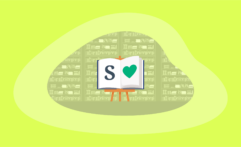Top 10 Positive & Impactful Synonyms for “Infectious” (With Meanings & Examples)
Affiliate Disclosure
Hey fellow impactful ninja ?
You may have noticed that Impactful Ninja is all about providing helpful information to make a positive impact on the world and society. And that we love to link back to where we found all the information for each of our posts.
Most of these links are informational-based for you to check out their primary sources with one click.
But some of these links are so-called "affiliate links" to products that we recommend.
Why do we add these product links?
First and foremost, because we believe that they add value to you. For example, when we wrote a post about the environmental impact of long showers, we came across an EPA recommendation to use WaterSense showerheads. So we linked to where you can find them. Or, for many of our posts, we also link to our favorite books on that topic so that you can get a much more holistic overview than one single blog post could provide.
And when there is an affiliate program for these products, we sign up for it. For example, as Amazon Associates, we earn from qualifying purchases.
What do these affiliate links mean for you?
First, and most importantly, we still only recommend products that we believe add value for you.
When you buy something through one of our affiliate links, we may earn a small commission - but at no additional costs to you.
And when you buy something through a link that is not an affiliate link, we won’t receive any commission but we’ll still be happy to have helped you.
What do these affiliate links mean for us?
When we find products that we believe add value to you and the seller has an affiliate program, we sign up for it.
When you buy something through one of our affiliate links, we may earn a small commission (at no extra costs to you).
And at this point in time, all money is reinvested in sharing the most helpful content with you. This includes all operating costs for running this site and the content creation itself.
What does this mean for me personally?
You may have noticed by the way Impactful Ninja is operated that money is not the driving factor behind it. It is a passion project of mine and I love to share helpful information with you to make a positive impact on the world and society. However, it's a project in that I invest a lot of time and also quite some money.
Eventually, my dream is to one day turn this passion project into my full-time job and provide even more helpful information. But that's still a long time to go.
Stay impactful,
Captivating, invigorating, and viral—positive and impactful synonyms for “infectious” enhance your vocabulary and help you foster a mindset geared toward making a positive impact. So, we had to ask: What are the top ten positive & impactful synonyms for “infectious”?
The top 10 positive & impactful synonyms for “infectious” are contagious, enthusiastic, captivating, exhilarating, invigorating, inspiring, magnetic, uplifting, viral, and radiant. Using these synonyms helps you enhance both your communication and psychological resilience in several meaningful ways.
In the table below, you can see all these top ten synonyms including their descriptions, why they are positive and impactful synonyms for “infectious,” and example sentences that highlight how you can use each of these. We’ll then also share ten benefits of why you should use these synonyms, ten interesting facts about the word “infectious,” and a brief history of the development of our alphabet.
Here Are the Top 10 Positive & Impactful Synonyms for “Infectious”
Our list of positive & impactful synonyms for “infectious” help you expand your vocabulary and enhance both your communication and psychological resilience in several meaningful ways (you can read more about it in the next section).
That’s why it’s so important to focus on synonyms that can be used in a positive and impactful way.
Infectious: (of a disease or disease-causing organism) liable to be transmitted to people, organisms, etc. through the environment | likely to spread or influence others in a rapid manner
Oxford Dictionary
Our top ten synonyms for “infectious” exemplify the beauty of our language—their meaning is not just fixed but can be shaped by the context they are used in.
| Synonym | Description | Example Sentence |
| Contagious | Spreading quickly and widely among people through direct or indirect contact, highlighting ‘infectious’ in its rapid transmission of something, usually in a positive context like enthusiasm or joy | “Her contagious enthusiasm for the project inspired the whole team.” |
| Enthusiastic | Showing intense and eager enjoyment, interest, or approval, akin to ‘infectious’ in its ability to spread excitement | “His enthusiastic spirit was infectious, lifting everyone’s mood.” |
| Captivating | Capable of attracting and holding interest or attention, paralleling ‘infectious’ in its ability to engage and influence others | “The captivating melody had an infectious quality, staying in one’s mind long after.” |
| Exhilarating | Making one feel very happy, animated, or elated; thrilling, similar to ‘infectious’ by energizing and uplifting others | “The exhilarating news spread with infectious joy throughout the community.” |
| Invigorating | Giving strength or energy to, echoing ‘infectious’ in its stimulating and revitalizing effect on others | “Her invigorating leadership had an infectious effect on the team’s productivity.” |
| Inspiring | Filling someone with the urge or ability to do or feel something, especially creative, akin to ‘infectious’ in motivating others | “His inspiring dedication to the cause had an infectious impact, rallying many to join.” |
| Magnetic | Possessing an extraordinary power or ability to attract, reflecting ‘infectious’ in its ability to draw people together | “Her magnetic personality was infectious, drawing people to her ideas.” |
| Uplifting | Morally or spiritually elevating; inspiring optimism or hope, paralleling ‘infectious’ in its positive influence on mood and outlook | “The uplifting message of the film had an infectious warmth that spread among viewers.” |
| Viral | Becoming very popular by circulating quickly from person to person, especially through the internet, similar to ‘infectious’ in the rapid spread of content | “The viral dance craze had an infectious rhythm that everyone wanted to follow.” |
| Radiant | Sending out light; shining or glowing brightly, akin to ‘infectious’ in its spread of positivity and light | “Her radiant smile was infectious, brightening up the gloomy day for everyone.” |
10 Benefits of Using More Positive & Impactful Synonyms
Our positive & impactful synonyms for “infectious” help you expand your vocabulary and enhance both your communication and psychological resilience in several meaningful ways:
- Encouraging Positive Framing: Using positive synonyms allows for a more optimistic and affirmative way of expressing thoughts. This can influence not only the speaker’s or writer’s mindset but also positively impact the audience’s perception and reaction.
- Improving Emotional Intelligence: Learning different positive synonyms helps in accurately expressing emotions. This aids in emotional intelligence, as one can more precisely convey feelings and understand the emotions of others.
- Enhancing Persuasive Communication: In persuasive writing and speaking, using positive synonyms can be more effective in convincing an audience, as people generally respond better to positive language.
- Broadening Emotional Vocabulary: A range of positive synonyms enriches your emotional vocabulary. It’s one thing to say you’re “happy” and another to express that you’re “elated,” “joyful,” or “content.” Each word carries a unique emotional hue.
- Creating a Positive Atmosphere: The use of positive language can create a more constructive and encouraging atmosphere in both personal and professional settings. This can lead to better teamwork, more effective communication, and improved interpersonal relationships.
- Enhancing Creative Writing: For those engaged in creative writing, a repertoire of positive synonyms can help in vividly depicting scenes, characters, and emotions, making the narrative more engaging and lively.
- Improving Mental Health and Well-being: Regularly using and thinking in terms of positive words can influence one’s mental state and outlook on life. Positive language has been linked to greater well-being and a more optimistic outlook.
- Improving Cognitive Flexibility: Expanding your vocabulary with positive synonyms enhances your cognitive flexibility. This means you become more adept at thinking creatively and adapting your language use to different situations. The mental exercise involved in learning and using a variety of positive words can also contribute to overall cognitive health, keeping your mind sharp and responsive.
- Building Social Skills and Empathy: When you have a variety of positive words at your disposal, you’re better equipped to offer compliments, encouragement, and empathetic responses in social interactions.
- Facilitating Conflict Resolution: In situations of conflict, the use of positive language can help de-escalate tension. Having a range of positive synonyms allows for more constructive and diplomatic communication.
Overall, your use of positive synonyms not only broadens your vocabulary but also positively influences your thought processes, emotional expression, and interpersonal interactions.
10 Interesting Facts About the Word “Infectious”
Let’s take a step back and have a look at some interesting facts about the word “infectious”.
- Broad Meaning: Beyond its primary medical context, “infectious” can describe anything that spreads rapidly and widely, from emotions to ideas.
- Etymology: The word “infectious” comes from the Latin “infectiosus,” meaning capable of infecting, underscoring its origins related to disease and transmission.
- Medical Context: In medicine, “infectious” refers to diseases caused by organisms such as bacteria, viruses, fungi, or parasites that can be transmitted from person to person, animal to person, or from the environment to a person.
- Infectious vs. Contagious: While often used interchangeably, “infectious” broadly refers to all diseases that can be spread, whereas “contagious” specifically refers to diseases that are easily transmitted directly from person to person.
- Psychological Aspect: Emotions or behaviors can be described as “infectious” when they spread quickly and influence others, such as infectious laughter or enthusiasm.
- Cultural Influence: Certain cultural phenomena or trends can be termed “infectious” when they spread rapidly across populations, such as viral videos or music.
- Epidemiology: In epidemiology, the study of infectious diseases involves understanding how diseases spread, their impact on populations, and strategies for control and prevention.
- Historical Impact: Infectious diseases have significantly influenced history, shaping the outcomes of wars, migrations, and the development of public health systems.
- Vaccination: The development of vaccines has been a critical tool in combating infectious diseases, leading to the eradication or control of many deadly illnesses.
- Public Health Measures: Quarantine, sanitation, and vaccination campaigns are among the public health measures used to control the spread of infectious diseases.
A Brief History of Our Alphabet
The story of our alphabet has a rich and compelling history, beginning with ancient civilizations and carrying forward into the present day.
The history of our modern alphabet is a fascinating journey that spans several millennia and cultures. It’s commonly referred to as the Latin or Roman alphabet, and here’s a brief overview of its evolution:
- Phoenician Alphabet (circa 1050 BCE): The story begins with the Phoenician alphabet, one of the oldest writing systems known to use a one-to-one correspondence between sounds and symbols. This Semitic alphabet had about 22 consonants, but no vowels, and was primarily used for trade.
- Greek Alphabet (circa 800 BCE): The Greeks borrowed and adapted the Phoenician script. Crucially, they introduced vowels, making it one of the first true alphabets where each symbol represented a distinct sound (both vowel and consonant). The Greek alphabet had a significant influence on the development of other alphabets.
- Etruscan Alphabet (circa 700 BCE): The Etruscan civilization in Italy adapted the Greek alphabet to their own language. While Etruscan was largely replaced by Latin, their version of the alphabet was a key predecessor to the Roman one.
- Latin Alphabet (circa 700 BCE – Present): The Latin alphabet emerged from the adaptation of the Etruscan script. Ancient Rome used this alphabet, and it spread across Europe as the Roman Empire expanded. The original Latin alphabet did not contain the letters J, U, and W. These were added much later along with other modifications to suit different languages and phonetic needs.
- Modern Variations: Today, the Latin alphabet is the most widely used alphabetic writing system in the world. It has undergone various changes to accommodate different languages and sounds. For instance, English—among other languages—added letters like ‘J’, ‘U’, and ‘W’, while other languages incorporate additional characters like ‘Ñ’ in Spanish or ‘Ç’ in French.
This evolution reflects not just linguistic changes but also cultural and historical shifts, as the alphabet was adapted by different societies across centuries.
Final Thoughts
Expanding your vocabulary is akin to broadening your intellectual horizons and enhancing your capacity to express your thoughts and emotions with precision. By embracing additional synonyms for “infectious,” you’re not just learning new terms, but you’re also gaining nuanced ways to communicate positivity and impact.
The more words you have at your disposal, the more accurately and vividly you can paint your thoughts into speech and writing. So, by growing your vocabulary, especially with positive and impactful words, you’re empowering yourself to engage more effectively and inspiringly with the world around you.
Stay impactful,

Sources
- Society for Personality and Social Psychology: Why a Simple Act of Kindness Is Not as Simple as It Seems: Underestimating the Positive Impact of Our Compliments on Others
- Journal of Personality: Psychological Resilience and Positive Emotional Granularity: Examining the Benefits of Positive Emotions on Coping and Health
- David Sacks: Letter Perfect: The Marvelous History of Our Alphabet From A to Z
- Impactful Ninja: Positive & Impactful Words Starting With A
- Impactful Ninja: Positive & Impactful Words Starting With B
- Impactful Ninja: Positive & Impactful Words Starting With C
- Impactful Ninja: Positive & Impactful Words Starting With D
- Impactful Ninja: Positive & Impactful Words Starting With E
- Impactful Ninja: Positive & Impactful Words Starting With F
- Impactful Ninja: Positive & Impactful Words Starting With G
- Impactful Ninja: Positive & Impactful Words Starting With H
- Impactful Ninja: Positive & Impactful Words Starting With I
- Impactful Ninja: Positive & Impactful Words Starting With J
- Impactful Ninja: Positive & Impactful Words Starting With K
- Impactful Ninja: Positive & Impactful Words Starting With L
- Impactful Ninja: Positive & Impactful Words Starting With M
- Impactful Ninja: Positive & Impactful Words Starting With N
- Impactful Ninja: Positive & Impactful Words Starting With O
- Impactful Ninja: Positive & Impactful Words Starting With P
- Impactful Ninja: Positive & Impactful Words Starting With Q
- Impactful Ninja: Positive & Impactful Words Starting With R
- Impactful Ninja: Positive & Impactful Words Starting With S
- Impactful Ninja: Positive & Impactful Words Starting With T
- Impactful Ninja: Positive & Impactful Words Starting With U
- Impactful Ninja: Positive & Impactful Words Starting With V
- Impactful Ninja: Positive & Impactful Words Starting With W
- Impactful Ninja: Positive & Impactful Words Starting With X
- Impactful Ninja: Positive & Impactful Words Starting With Y
- Impactful Ninja: Positive & Impactful Words Starting With Z




